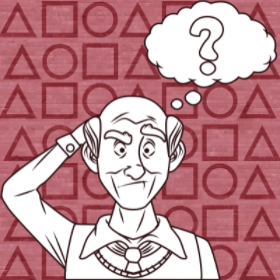Hi everyone – Hannah here and for my blog today I want to discuss something a little bit different to my previous topics… Squid Game. Squid Game you say… Some type of sub-aquatic calamari entertainment?? Well – if you haven’t seen Netflix’s 2021 smash hit Squid Game yet I don’t know what to tell you, other than spoiler alert!
I know what you’re thinking – I’m still reading a dementia blog and not E! online right? Why yes you are, and I will explain why Squid Game is an interesting topic to people involved in the study of dementia. It’s all about player 001, the first player to enter the Squid Game named Oh Il-nam (which translates as “first man” in Korean); however, he is commonly referred to as “old man” throughout the show (wonderful I know!). He is the eldest player in Squid Game, and he joins the game after being diagnosed with a brain tumour. He appears as a vulnerable and helpless character, thereby winning the affections of the main character Gi-Hun (player 456), as they spark a strong friendship he is then taken under his protection.
As the episodes go by, and the story progresses, player 001’s health appears to rapidly deteriorate. He exhibits what appears to be cognitive impairment – characterised in the show as dementia. But how accurate is this representation? Is this really what dementia looks like? And why is this important? It may seem like I’m reaching here, but as a show that has reached over 111 million viewers in a very short space of time, the way in which dementia is represented within it is very important to public perception and general global awareness of the condition. So, let’s break it down – what does player 001’s portrayal tell us about the dementia experience?

What did you think of the way Squid Game represented cognitative impairement?
At the start of the series his cognitive state is not entirely apparent – his recognition and recollection are unhindered as he recalls his reason for participating in the games and his underlying co-morbidities with clarity, so the viewer is not yet informed of his apparent dementia state. It is only when the intensity of the games increases that player 001 begins to exhibit dementia-like symptoms which appear to be stress-induced, such as confusion, distress, and agitation. Despite this apparent relapse, during the “tug of war game”, he exhibits no cognitive deficit when recalling the winning strategy to his team. His most obvious demonstration of dementia-like symptoms was during the “marble game”, where he loses engagement and focus on the task and appears confused – recalling the set of the game as if it were his childhood home. At times his reactions appear slow and seems unfazed by the impeding consequence of losing a game, other players mark this down to his dementia and his lack of ability to recognise his potential fate.
Of course, now we know he was never truly a player, so his portrayal was an act (and of course – fictional in the first place) – but the Squid Game depiction of dementia is not all too unrealistic. Symptoms can be exacerbated by stress and anxiety – which is clearly demonstrated in the show. Often dementia symptoms are reduced to memory loss alone, so I appreciate that other aspects of cognition as well as broader factors of behaviour and function were also shown.
However, there are some important reflections to come out of this. This criticism isn’t limited to the Netflix series alone but rather of the broader media representation of the condition. If this is how dementia is being seen by populations – is the correct image being portrayed? Dementia is an irreversible condition with no cure, but that doesn’t mean there is no hope, and with newer interventions focusing on promoting living well with Dementia – a media representation of not only the harsh lows, but too of the hopeful highs, would in my opinion be better for encouragement and raising the right type of awareness.
Thanks for tuning in, Hannah.

Hannah Hussain
Author
Hannah Hussain is a PhD Student in Health Economics at The University of Sheffield. As a proud third generation migrant and British-Asian, her career path has been linear and ever evolving, originally qualifying as a Pharmacist in Nottingham, then Health Economics in Birmingham. Her studies have opened a world into Psychology, Mental Health and other areas of health, and with that and personal influences she found her passion for dementia.

 Print This Post
Print This Post




